MARIEB COLLEGE OF HEALTH & HUMAN SERVICES
A YEAR OF GROWING BIGGER AND BETTER
FLORIDA GULF COAST UNIVERSITY
2021-2022 ANNUAL REPORT
This year began with several challenges related to the COVID-19 pandemic. We quickly adjusted and moved forward, celebrating
some impressive milestones as we plan for the exciting opportunities ahead.”



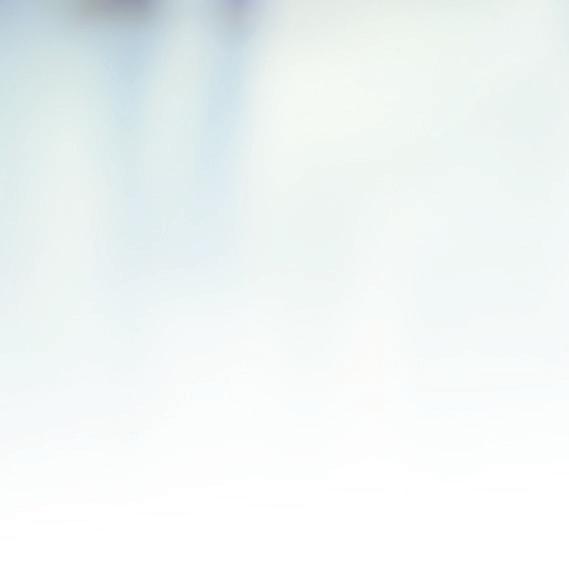
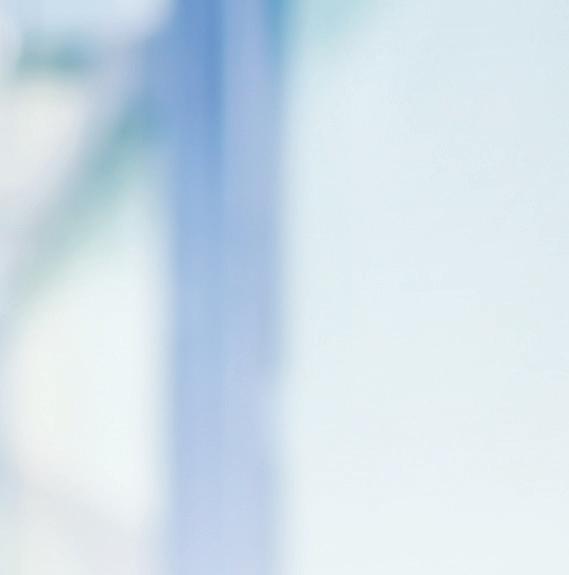
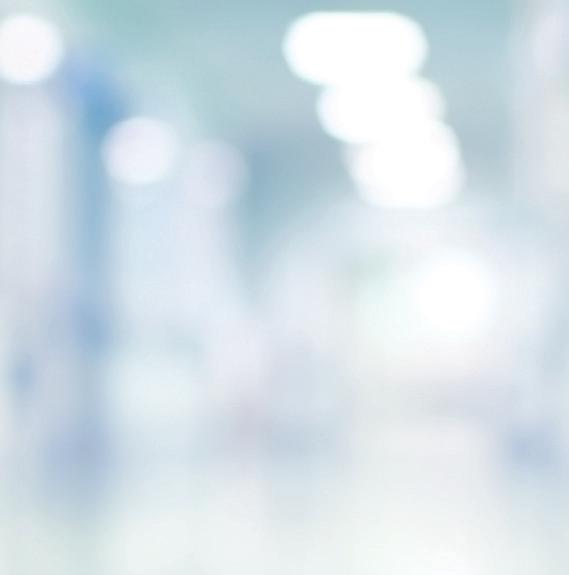

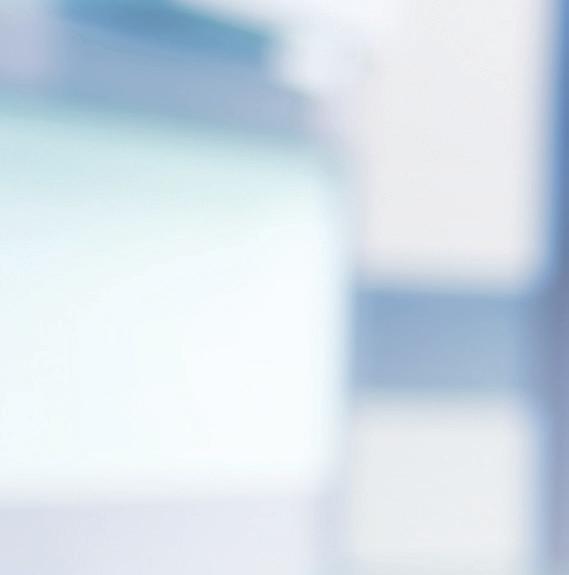

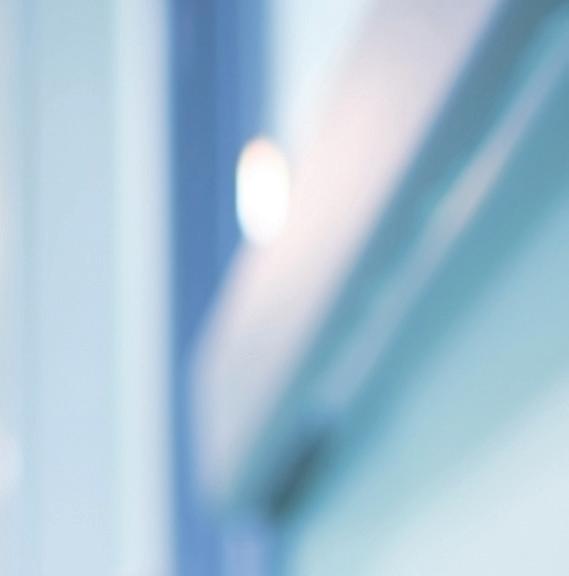
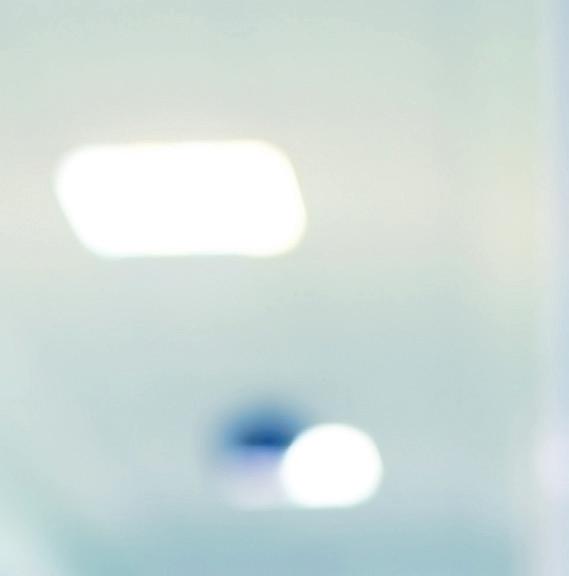

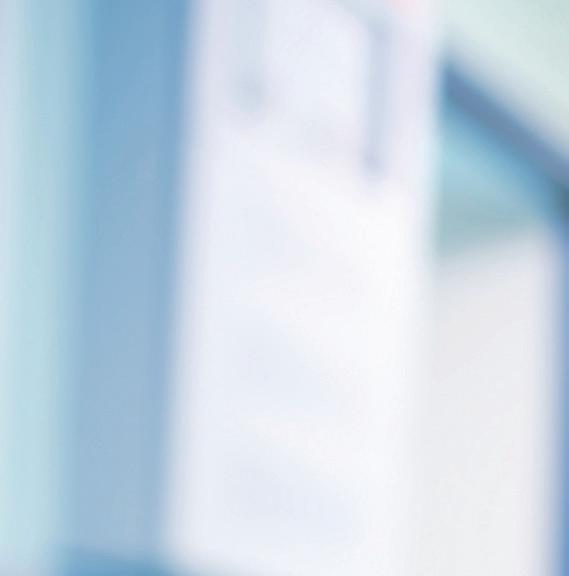

DEPARTMENT
OF
SOCIAL WORK
– Shawn Felton, Interim Dean
Marieb
College of Health & Human Services
Table of Contents MESSAGE FROM THE DEAN ...................................................................................... 4 SCHOOL OF NURSING ............................................................................................. 6 .............................................................................. 8 COUNSELING AND PSYCHOLOGICAL SERVICES ........................................................ 12 DEPARTMENT OF REHABILITATION SCIENCES ......................................................... 16 DEPARTMENT OF HEALTH SCIENCES ....................................................................... 18 DEPARTMENT OF COUNSELING .............................................................................. 20
A MESSAGE FROM THE DEAN

Dear students, faculty, alumni and friends,
On these pages, you will see highlights that illustrate the impact of our college over the last year.
This past academic year, we celebrated two landmark events. In February, we marked the 10-year anniversary of Dr. Elaine Nicpon Marieb’s gifts that resulted in the naming of Academic Building 8 as Marieb Hall. We also commemorated the five-year anniversary of the naming of the Marieb College of Health & Human Services as a tribute to this remarkable woman’s ongoing support. We work daily to expand Dr. Marieb’s legacy and are forever grateful for her belief in our vision.
This year began with several challenges related to the COVID-19 pandemic. The surge of illness required extreme flexibility by our students, faculty and staff. However, through all of this, everyone’s spirits and resolve remained strong.
This report illustrates the many successes we enjoyed despite those challenges. Most impressive is how well our students continued to perform on licensure and certification examinations. Students in all programs excelled, scoring almost 100% pass rates across disciplines that have a licensure or certification examination at the program conclusion.
Like most years, the college hosted several specialized accreditation visits, including those of the ARC-PA and the COA. Both resulted in superb results and reaffirmed the excellence of the Marieb College’s academic offerings. Most impressive is that our physician assistant program received continuing accreditation for 10 years. That’s three years more than most programs receive after provisional accreditation.
Special thanks to our PA faculty. They have worked tirelessly to create one of the best PA programs in the Southeast.
We also had a great year with respect to philanthropic support and belief in the vision of our college. The Shady Rest Foundation contributed almost $10 million to the college in the past academic year.
At the university’s Silver Celebration, the board committed $5 million to launch the Shady Rest Institute on Positive Aging, an interprofessional hub connecting services, resources and advancing research involving older adults.
In the coming year, thanks to the Florida Legislature, we will embark on expanding our nursing program. We expect to grow the undergraduate program by at least 50%.
Lastly, the college remains innovative by offering a new credential known as a digital badge or micro-credential. Through a partnership with Arthrex, a medical device supply company based in Southwest Florida, we will offer a digital badge in the medical device industry. In early fall, we will launch a non-credit micro-credential known as the Senior Care Partner for those who will serve as patient navigators for older adults.
Please enjoy the stories in this year’s annual report. Remember that for every story we tell, there are several more that have gone untold. I am so proud to lead our dedicated faculty and staff and serve our remarkable students. Thank you for your ongoing support.
Anne Nolan, longtime director of nursing school, retires
After 11 years in charge, Anne Nolan, Ph.D., R.N., retired July 1 as director of the School of Nursing, leaving behind an impressive legacy.
“When I walked into the position in January 2011, I was the interim director,” Nolan says. “We had nine faculty at the instructor level and only four ranked faculty.”
Her first mission was to build the team of experienced faculty and improve programs so that student outcomes would improve.
“That’s what we did,” she says. “We’ve had the highest pass rates in the State University System for the last five years. That was an achievement.”
She says she is also proud of having built a team of faculty and staff members “committed to the shared vision of the mission and work climate. It’s a lot of hard work, but we have succeeded while also having a laugh and enjoying one another’s company.”
Building new programs and transitioning the nurse practitioner and nurse anesthesiology programs to the doctoral level are also accomplishments she considers highlights of her time as the school’s leader.
As a tribute to her lasting impact upon the school, she was the first recipient of the Joan Glacken Faculty Award of Distinction, named after the former Marieb professor and associate dean. It will be bestowed annually upon individuals who have made a long-lasting, meaningful impact upon Marieb College.
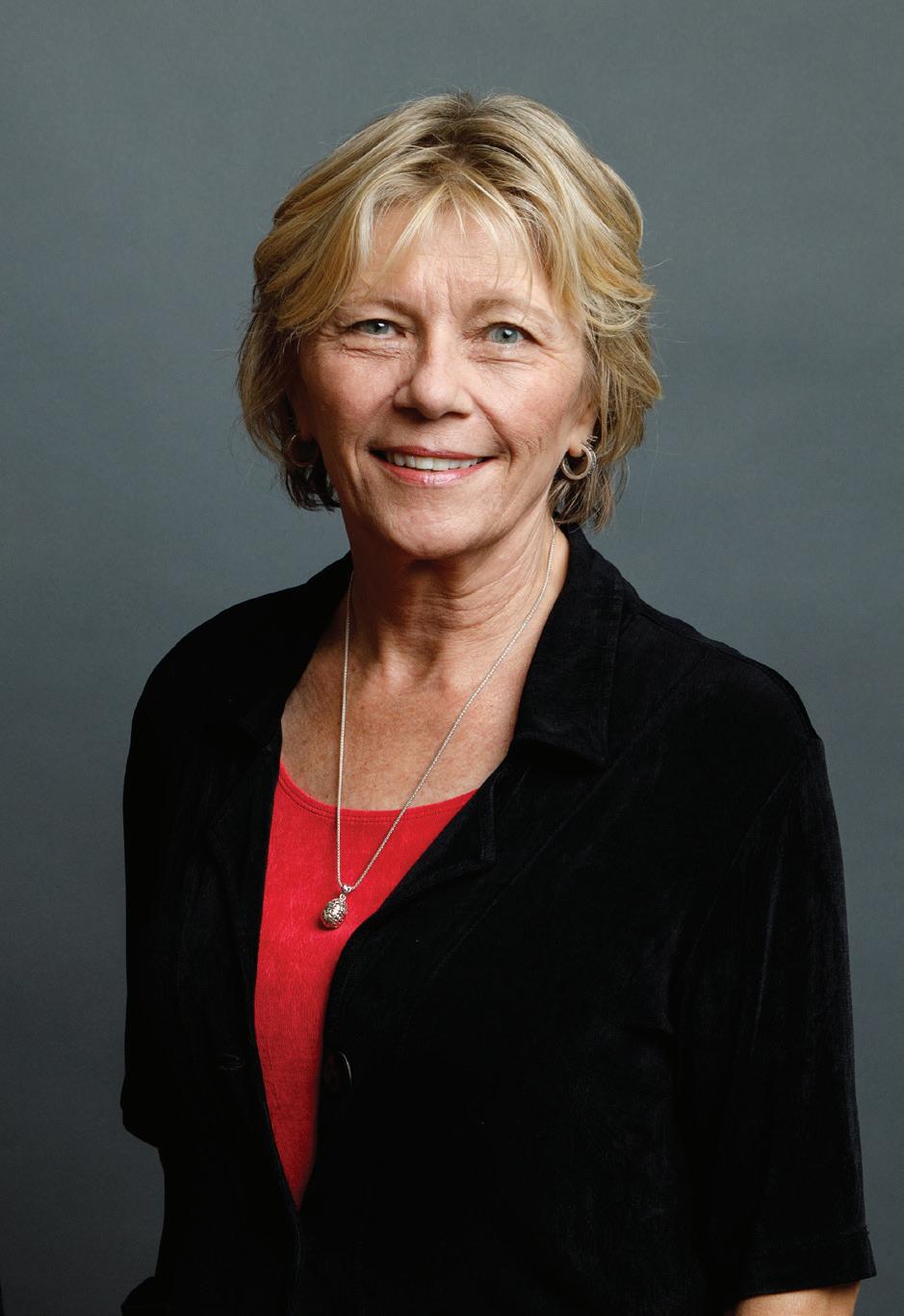 Shawn Felton, Interim Dean Marieb College of Health & Human Services
Shawn Felton, Interim Dean Marieb College of Health & Human Services
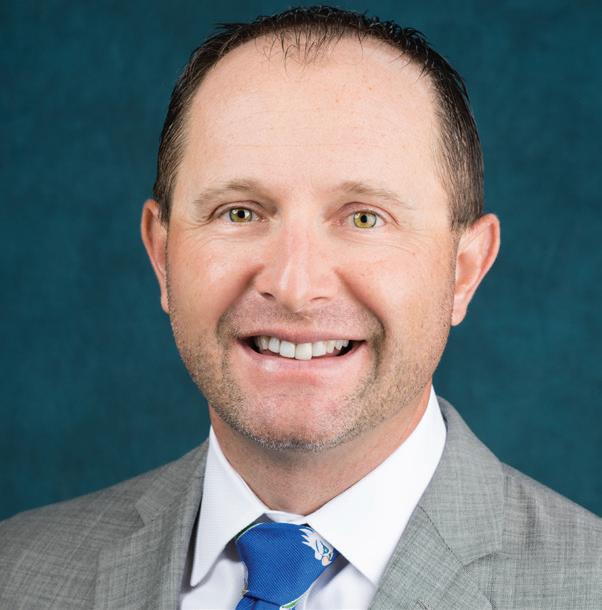
It is my pleasure to present the second annual report of the Marieb College of Health & Human Services.
All the best,
4 MARIEB COLLEGE OF HEALTH & HUMAN SERVICES
We’ve had the highest pass rates in the State University System for the last five years. That was an achievement.”
— Anne Nolan, Ph.D., R.N. Retired Director of the School of Nursing
2021-2022 ANNUAL REPORT 5
SCHOOL OF NURSING DEGREE PROGRAMS
} Nursing (BSN)
} Nurse Educator (MSN)
} Nurse Practitioner (BSN to DNP)
} MSN to DNP
} Nurse Anesthesiology (BSN to DNP)
} Nurse Anesthesiology (MSN to DNP)
CERTIFICATE
} Nurse Educator
SCHOOL OF NURSING
School of Nursing continues its record of excellence as leadership transitions
It was another stellar year for the dedicated faculty, staff and students in FGCU’s School of Nursing. And that was true even though COVID-19 caused disruptions in schedules and forced students and faculty to wear bulky protective gear and to expect the unexpected.
Nonetheless, classes remained live and in person, students progressed, faculty published books, one completed a doctoral degree while another became a family practitioner and advanced faculty continued to spend a day a week in the field at community clinics and hospitals to keep their skills sharp.
Among the 2021-22 highlights:
} Both the Master of Nursing Practice and Doctor of Nursing Practice programs were ranked by U.S. News & World Report.
} Shady Rest Foundation provided $3 million in funding for scholarships for undergraduates and graduate students who plan to work with older adults.
} The school had its accreditation visit for the anesthesia program and was found compliant in all standards. Results are due in October, but a 10-year accreditation is anticipated.
} The school bid farewell to six remarkable faculty members, starting with Dr. Anne Nolan, director of the School of Nursing; as well as Dr. Rosann Spiegel, nurse anesthesiology program director; Dr. Lolita Melhado, assistant professor, DNP program; Dr. Cheryl Swayne, assistant professor, DNP program; Katherine Ingram, BSN instructor; and Tina Ellis, BSN instructor. Collectively, the group had more than 200 years of nursing experience.
} The Doctor of Nursing Practice Nurse Anesthesiology program held its inaugural white coat ceremony with a presentation to 24 students. The ceremony was delayed from the fall but proved even more meaningful for the students after having spent five months in clinicals.




} BSN students achieved an outstanding NCLEX-RN (national licensure exam) pass rate of 97.67% for 2021 – the highest among State University System nursing programs once again. The national average for baccalaureate programs was 86.06%.
Employment after graduation:
First time certification pass rate for Doctor of Nursing Practice Family Nurse Practitioner graduates: 100%
MARIEB COLLEGE OF HEALTH & HUMAN SERVICES
100%
2021-2022 ANNUAL REPORT 76
DEPARTMENT OF SOCIAL WORK
DEGREE PROGRAMS
} Bachelor of Social Work (BSW)

} Master of Social Work (MSW)

CERTIFICATE
} Medical Social Work
Social work department remains engaged in meeting needs of community
Florida Gulf Coast University’s 120 undergraduate and 80 graduate social work students aren’t waiting to graduate to start tackling the problems of the world.
They are working with those who need them - the homeless, seniors, schoolchildren and others - as interns and volunteers.
Faculty members are teaching by example as well.
Hugh Clark, Ph.D., associate professor and chair of the Department of Social Work, says faculty are currently working in three areas of interest that have been identified as important to the community that is served by FGCU.
One ongoing project has been the Florida Higher Education Substance Use Disorder Consortium, a joint project with 12 social work departments across the state that have worked together to develop a curriculum on substance use disorders. Assistant Professor Leigh Taylor, Ph.D., and Clark have been active members of the consortium.
“We put together the consortium to develop a curriculum for social work programs, physician assistants, nurses, counselors,” Clark says. “It’s a 15-module curriculum on topics including policies, prevention and interventions. We see such a great need for being able to provide training in every aspect of substance abuse disorder.”
Meanwhile, Lirio Negroni, Ph.D., professor of social work, continues to work on the Immokalee Health Project, which looks at health disparities and prevention in the Collier County community. This research project will continue through the next year.
Leslie Meskin, DSW, an assistant professor of social work, has been active with the Community Autism Network on several autism-related research projects.
Social work faculty have also been involved with the Immokalee Foundation’s summer camps. Clark, Negroni, Taylor and Instructor Tammy Walker all worked with the foundation to provide lessons on leadership, diversity, mindfulness and self-care.
Social work students were out in the field helping with other big problems, such as the annual Lee County Point in Time Count. The student group is led by Tom Felke, Ph.D., associate professor and associate dean of Marieb College.
The students attend training then go into homeless camps and fields looking for those who are homeless so the county can attempt to track how many people there need housing, whether the numbers or rising or dropping and what other services are needed.
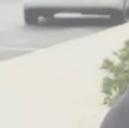
Other students continued conducting research in Immokalee on issues such as food insecurity. Still others worked with groups such as Community Cooperative and Blankets & Blessings, both of which provide services to area residents in need of basic services.


Students and alumni making headlines this year included:
} Alumna Evelyn Philistin (’21, MSW), right, was named South Zone Rookie of the Year by the Lee County School District for her outstanding work.
} Stephanie Cakov was the first student to receive a fellowship to work with older residents at the Naples Senior Center.
“She has a passion for working with seniors,” Clark says. Jackie Faffer, president and CEO of the Naples Senior Center, hopes that this will be the start of a long collaboration with the FGCU social work department.
} Riley McLean was named Student of the Year for her overall excellence, which included her academic performance as well as her internship at The Dubin Center, a nonprofit organization assisting those with Alzheimer’s disease or other forms of dementia. In nominating her for the award, Felke says, “Riley exemplifies the ideals of servant leadership.”
DEPARTMENT OF SOCIAL WORK
MARIEB COLLEGE OF HEALTH & HUMAN SERVICES 2021-2022 ANNUAL REPORT 98
Eagle alumni lead the fight against hunger, homelessness at Community Cooperative
Community Cooperative in Fort Myers is a nonprofit organization committed to eliminating hunger and homelessness. In Lee County, one in six residents needs food assistance. In 2021 alone, the cooperative assisted more than 42,226 county residents, providing 2 million-plus pounds of food to neighbors in need. To accomplish this enormous task, the cooperative relies on volunteers who logged some 32,000 hours.
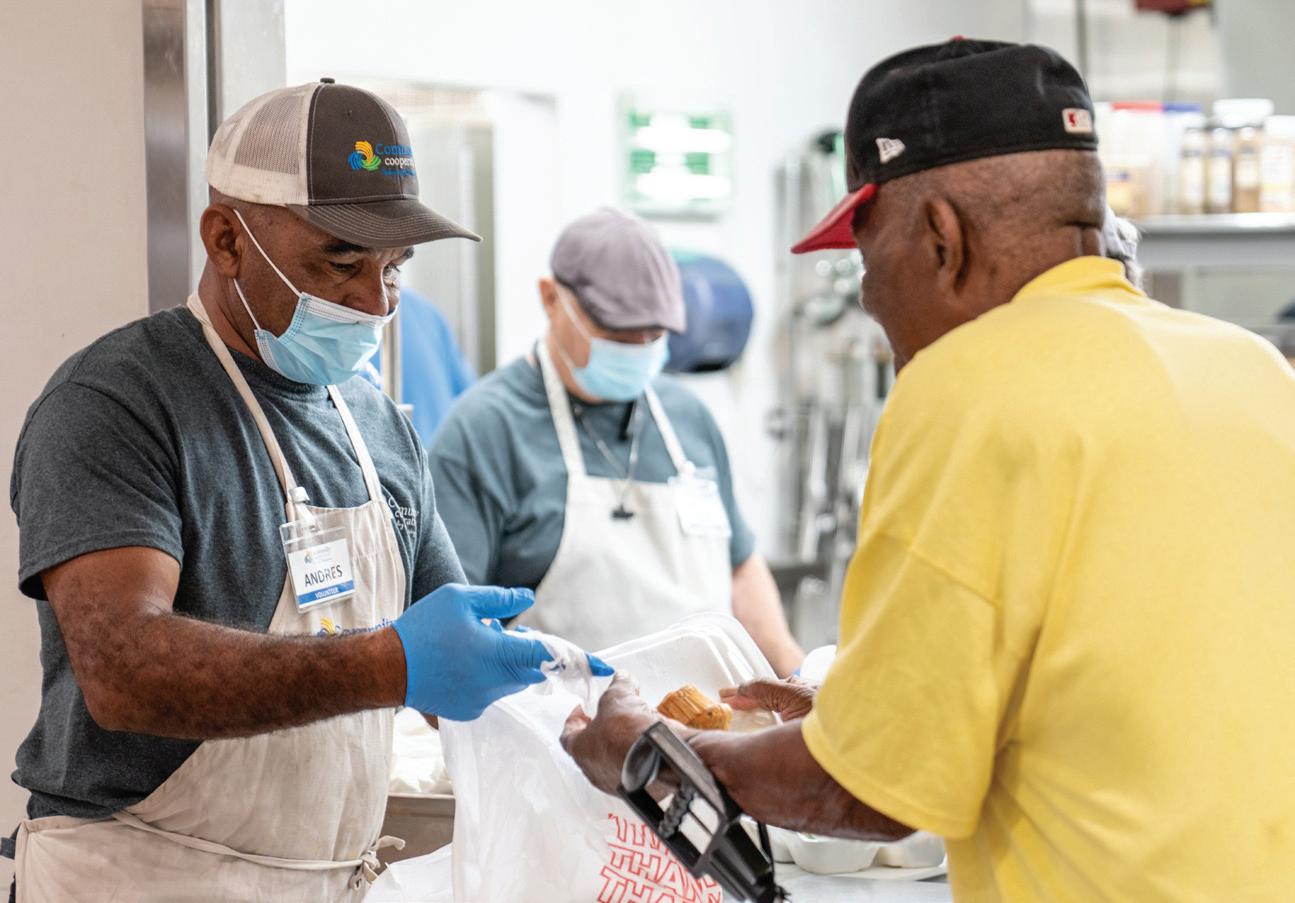
Florida Gulf Coast University student interns and alumni also helped lead the effort.
Kate Major (’14, Social Work) is a difference maker. She credits her grandmother for teaching her the importance of community and FGCU’s service-learning program for showing her the value of volunteering.
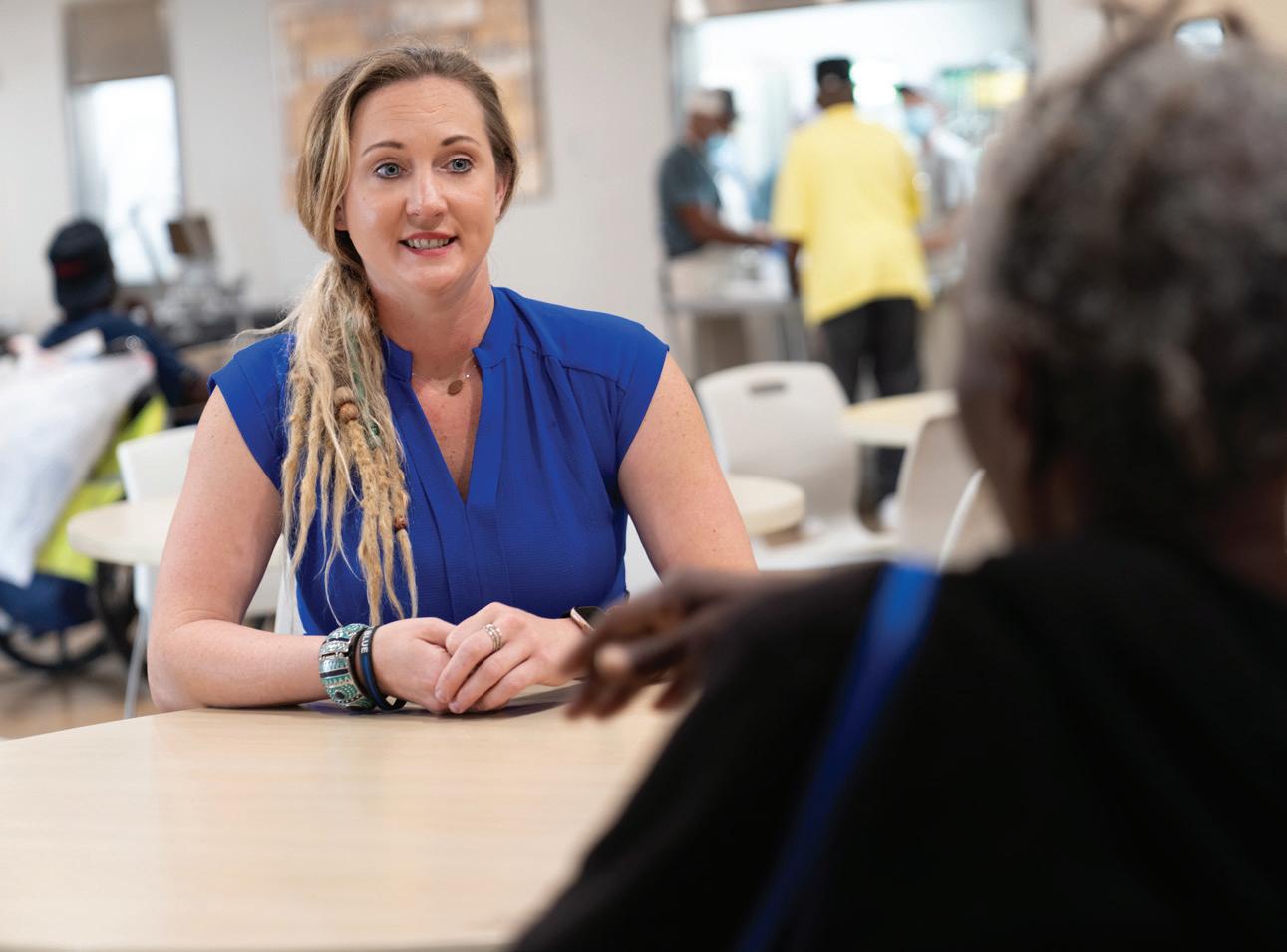
While at FGCU, Major interned at Community Cooperative, helping with special events and engaging in community outreach. She loved the experience and stayed on for a year after graduation. She then accepted a social worker position in a private practice for a couple of years, worked for Lee Health for a bit then returned to Community Cooperative in October 2021.
“I needed the time to grow and find my roots, the time to realize how lucky I was to be at the Community Cooperative,” Major says. “I feel like I make a difference here. I’m exactly where I’m supposed to be.”
Major supervises FGCU alumni John Roberts, (’18, Social Work), homeless care social worker, and Hoyuky Pec (’20, Social Work), family and elder care social worker. With Pec, she mentors Leticia Martinez, (’22, Social Work), one of several FGCU interns.
While Martinez had performed community service prior to engaging with FGCU’s servicelearning program, she said that interning at Community Cooperative broadened her knowledge base.
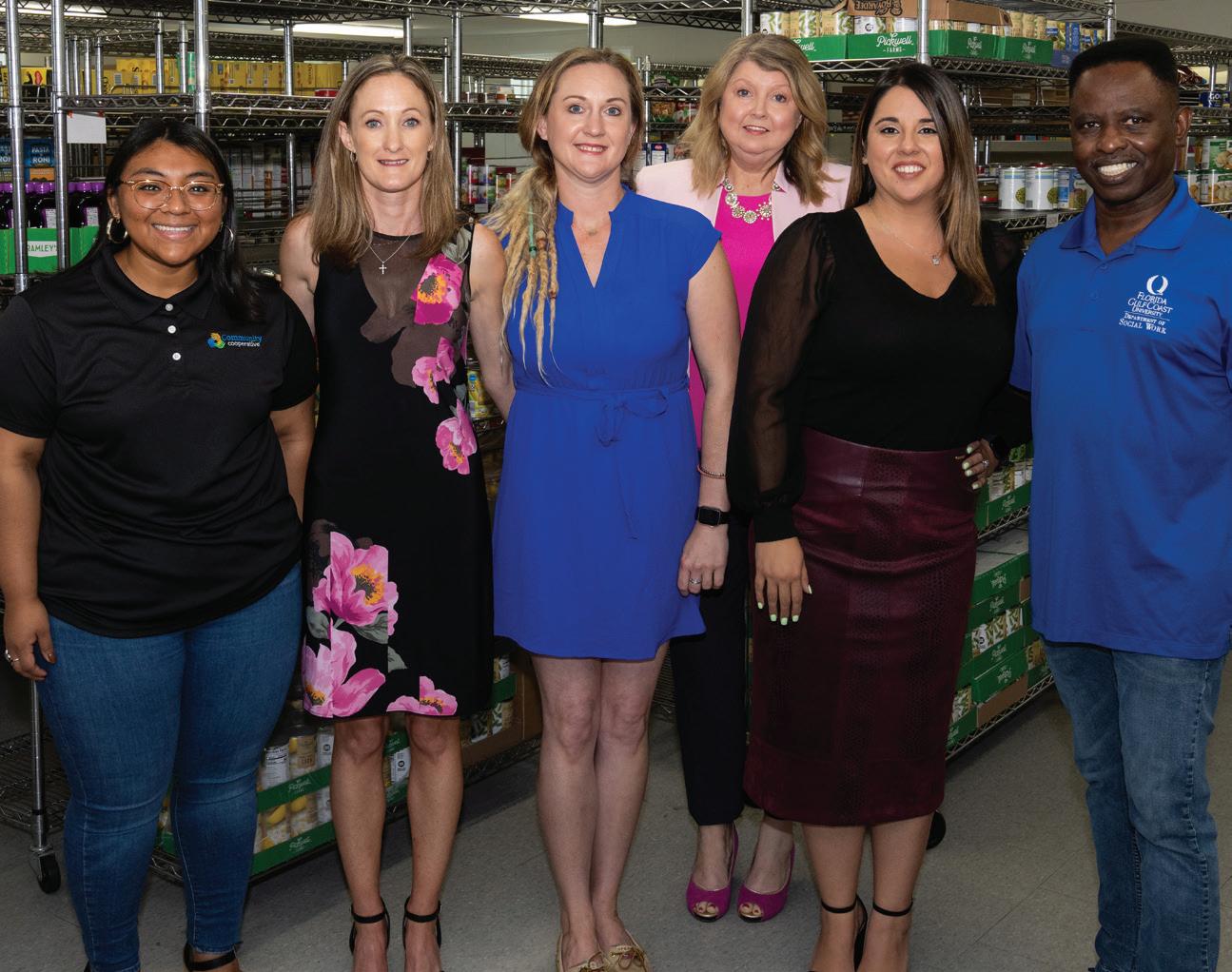
“Honestly, at first I was a little intimidated working with the homeless population. But you learn as you go,” she says. “Over time, I’ve developed clients of my own, and I learned a lot from them. It is an eye-opening experience. I grew up in Immokalee. There’s a lot of poverty there, and I’d like to work with the children.
“My internship has taught me lots that will be useful to me in my career.”
”
“I’m grateful for the community I live in and passionate about the work I do, Eagle alumna Kate Major says.
FGCU alumni working at Community Cooperative include, from left, Hoyuky Pec, Blair Fretwell, Kate Major, Tami Holliday, Grisel Brewster and John Roberts.
I needed the time to grow and find my roots, the time to realize how lucky I was to be at the Community Cooperative. I feel like I make a difference here. I’m exactly where I’m supposed to be.”
—Kate Major ’14, Social Work
10 MARIEB COLLEGE OF HEALTH & HUMAN SERVICES 2021-2022 ANNUAL REPORT 11
SERVICES
The silver lining from COVID-19 was learning to provide online service
The Counseling and Psychological Services (CAPS) division continues to pivot in order to assist students in new ways as they navigate the stresses of adjusting to college life.

One big change has been the realignment of CAPS into the Marieb College of Health & Human Services, which affords both the counseling center and the college additional benefits because they can share faculty staff positions.
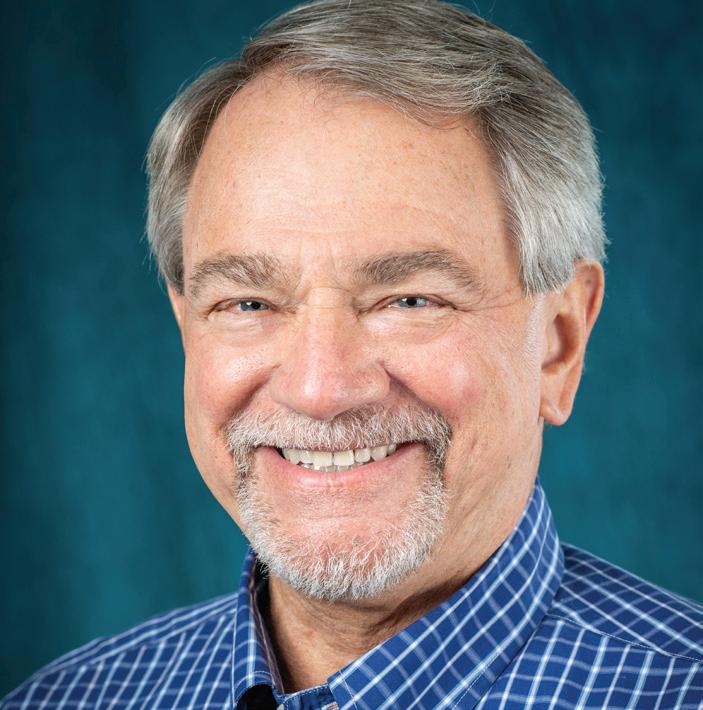
CAPS gains access to graduate students who can complete their internships there under a qualified supervisor. In turn, this provides additional staff for CAPS to assist students in need of access to services.
Another is that while COVID forced counseling to become an online encounter, that turned out to be a preferable method for many students who might not be inclined to seek services in person.
Mindful of the university’s focus on systemic racial inequality and injustice taking place in the country, CAPS staff understands students are not immune to the effects of these conditions. As a result, CAPS has worked even harder to be mindful of this, striving to gather data and build a strong partnership with the Office of Multicultural and Leadership Development and Jon Brunner
student representatives. The goal is to provide effective and accessible services to students who need support to heal and to know they belong.
Also noteworthy this year:
} CLASP - the Collegiate Life Alliance for Suicide Prevention - is an interdisciplinary group with an FGCU component as well as groups at several other universities around the state. They all gather monthly via Zoom to talk about initiatives, programs and a peer-run suicide prevention program the group developed. They are trying to recruit additional institutions to join in an effort to reduce suicide rates.
} Addition of UWILL, an independent contractor that provides online therapists to students, expanding further the access to counseling, and Togetherall, which offers peer-to-peer mental health and well-being support.
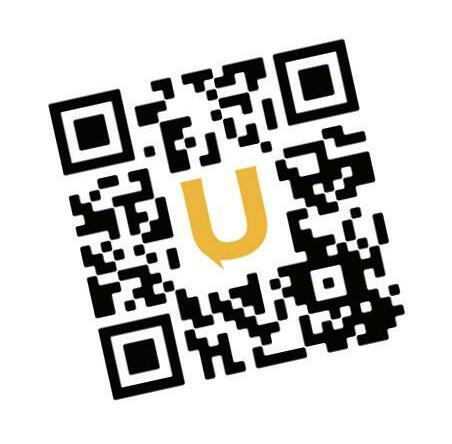
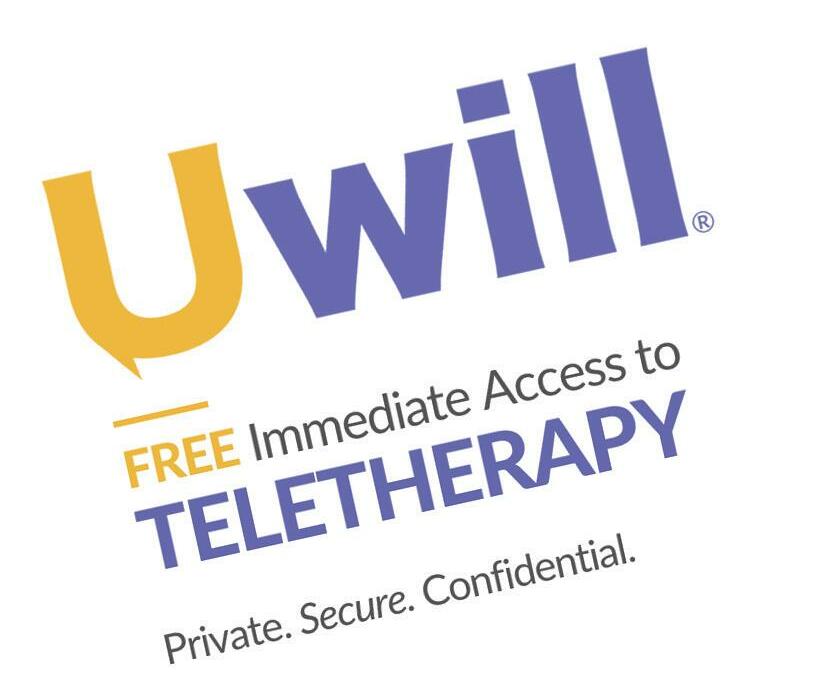
} Staff members are reaching out to various groups outside of the CAPS offices. Clinicians have met with student veterans in the veterans lounge to discuss issues of concern to them in a setting in which they are comfortable. Other discussions and support groups that met outside the CAPS offices was one for BIPOC students called Rising Up Standing Strong, held at the Multicultural and Leadership Development offices and the Back to Life group was held for those with chronic illnesses.
BY THE NUMBERS
clients
304
 COUNSELING
COUNSELING
AND PSYCHOLOGICAL
12 MARIEB COLLEGE OF HEALTH & HUMAN SERVICES
1,858 12,206 3,888
in-person
total in-person appointments online counseling/therapy sessions online group sessions 2021-2022 ANNUAL REPORT 13 Among the concerns students sought help for from CAPS: Trauma – 31% Self-esteem/Confidence – 27% Sleep – 24% Academic performance – 24% Eating/Body image – 24% Emotional dysregulation – 16% Social isolation – 15% Grief/Loss – 14% Suicidality – 14% Attention/Concentration – 13% Sexual abuse/Assault – 12%
Physician assistant program shows its vitalTherapy pup lifts spirits, brings relief to those in need of her quiet comfort
There’s one member of the Counseling and Psychological Services (CAPS) team who doesn’t say much – and sometimes falls asleep during sessions – but is highly effective when it comes to getting students to share their feelings.
Luna Rego uses touch therapy, as well as deep, soulful looks into the eyes of those she is helping. She isn’t bashful about bestowing a kiss or two when the spirit moves her either.
The 2-year-old pug was born, it seems, to be a therapy dog. She has been involved in the CAPS program since she was a mere pup and COVID-19 had cleared the FGCU campus of virtually all students.

“Everyone else was home, but we were here,” says Julie Rego, Ed.D., CAPS assistant director and Luna’s owner. “She’s been here since she was 3 months old. I’d see someone in crisis and Luna would assist. She grew up here.”
Despite her youth, she is a confident worker, handling group sessions and individual counseling sessions with aplomb.
Whether it’s crisis counseling or grief therapy, having Luna there makes it better and more effective, Rego says.
Some forms of trauma therapy “can be overwhelming, but she helps clients stay present,” she says. “She will sit beside them, put a paw on them, intermittently make them laugh.”
She’s even on social media.
“Sometimes students aren’t comfortable asking therapists questions,” Rego says. “They can write a question and have it answered through social media on Ask Luna. She’s pictured there on her golf cart.”
For those who wonder if this little dynamo is being exploited, fear not: She gets paid in pets and treats and only works two days a week. The other days she’s home with her baby brother, Bear, a black pug.
“Her reward is being with people,” Rego says.
“She loves the attention. All she wants is to be with somebody. Sessions are 45 or 50 minutes. She’ll fall asleep and they’ll continue to pet her. She’s even working when she’s snoring. They love the snoring.”
signs are in fine shape
The graduate physician assistant program, now in its fourth year, continues to demonstrate excellence.
All three of the classes that have graduated have done so with 95% first-time pass rates on the national certification exam – exceeding the national average of 93%, according to Robert Hawkes, the founding program director.
“Most of our students get multiple job offers before they even graduate,” Hawkes says.
The program was awarded a 10-year accreditation in March, which is a testament to its excellence, since most new programs get a five- or seven-year accreditation, he says.
Hawkes believes the reason is “we’ve got really good pass rates and a dedicated faculty that goes well above and beyond. Our student success proves the outcome and shows what we are doing.”
He also credits Kristina Mullins, the assistant program director, who has been there since the start. “Continuity helps build the strength of the program,” Hawkes says.
The three-year program is rigorous, with students completing 12 rotations during their last year. That’s 2,000 hours of practical experience in hospitals, medical offices and other health settings. Before that, they spend time in well-equipped laboratories that even have racially diverse mannequins on which they practice their skills.
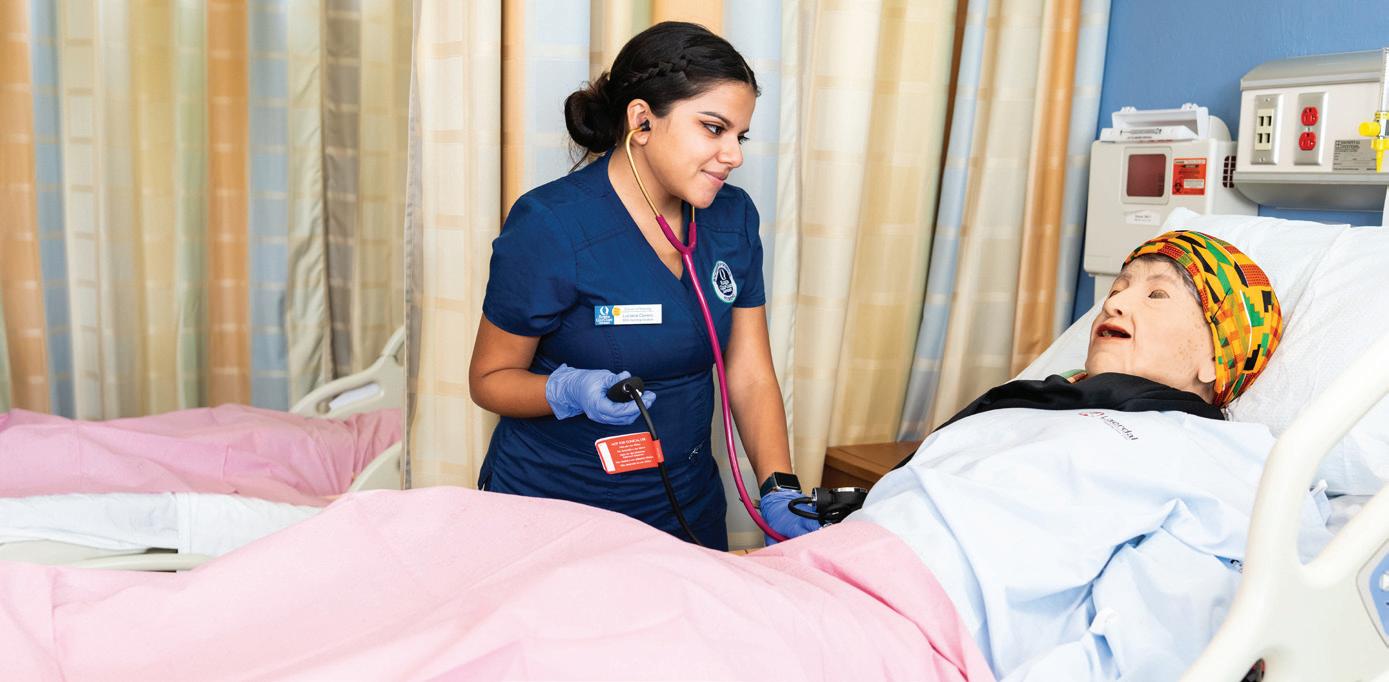
“We feel it’s important to show our applicants and students that we value diversity,” Hawkes says.
Demand remains high for this master’s degree. The program received 2,600 applications this year for its 20 spots. That’s 300 more than the year before. Hawkes thinks applications may increase even more in the 2022-23 academic year.
While that adds to his workload and that of the faculty because they review all the applications, they believe the outcomes are worth the effort.
“By far the majority of graduates stay in Southwest Florida and are directly contributing to our workforce and the medical community here,” he says.
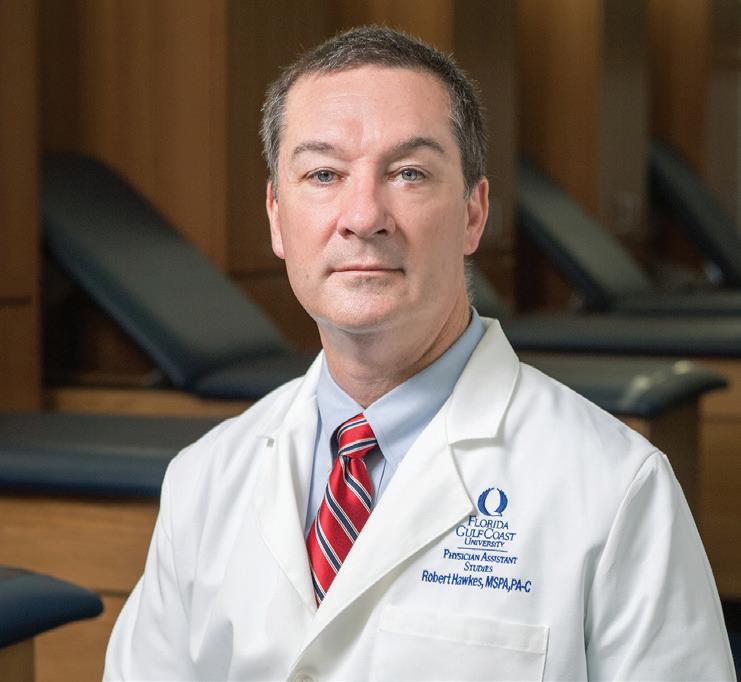
14 MARIEB COLLEGE OF HEALTH & HUMAN SERVICES
Robert Hawkes
2021-2022 ANNUAL REPORT 15
Department of Rehabilitation Sciences students demonstrate top form
There’s no question that the physical therapy and occupational therapy curricula are rigorous, but it’s also clear FGCU’s PT and OT students are up to the task: Both graduating classes had 100% first-time pass rates on their licensing board exams and 100% found jobs right away.
“These are high-demand professions,” says Eric Shamus, Ph.D., chair of the Department of Rehabilitation Sciences. “The job market is through the roof.”
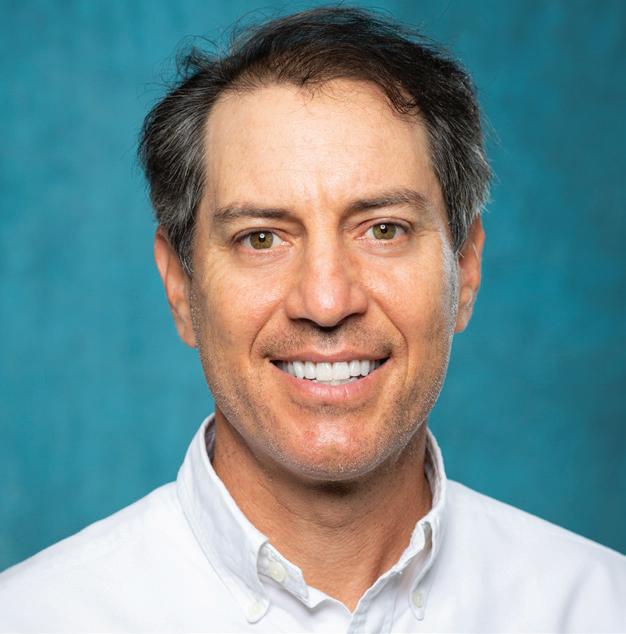
They even managed to create something positive from the COVID-19 pandemic that caused all classes to become virtual the previous year.
“We went back to normal, but some lecture and discussion groups continued to be virtual,” Shamus says. “Faculty and students seem to like the virtual aspect, so we plan to keep some of them virtual.”
That’s because virtual classes are convenient and comfortable, he says, especially for those who are on the go as much as these students are.
“From COVID we learned some alternative methods and that different students have different learning styles. We have the ability to offer both within the curriculum,” Shamus says.
Scholarships awarded by the Shady Rest Foundation provide funding for those who plan to work with older adults. That’s motivated more students to go in that direction.
Meanwhile, students continue to head into the community to practice their skills and help others. The exercise science students work to keep people fit while the physical therapy students help those with major dysfunctions get moving again, Shamus says.
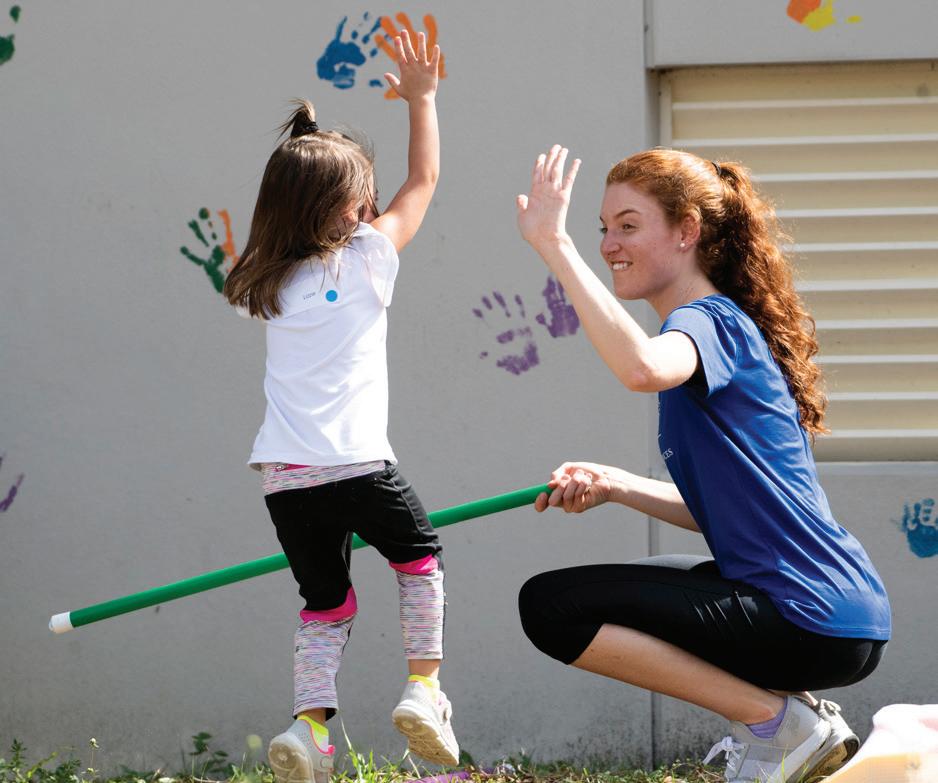
“Our department is good about trying to make people’s lives a better experience, and that’s really what OT, PT and exercise science are all about – to provide better experiences through life,” Shamus says. “There are great opportunities to get out in the community here. It’s an excellent living laboratory, and the students do very well.”
Some highlights from the year include:
} Occupational therapy students had the opportunity to discuss autism and transitioning in a neuro-typical world with Temple Grandin. The renowned author and speaker on autism and animal behavior was on campus to speak at FGCU’s annual autism conference.
} Students continued their community outreach. They offered body composition analysis for members of various law enforcement departments, including the Fort Myers Police Department and the Charlotte County SWAT team, conducted health screenings for residents of Cypress Cove and offered free-fall risk assessments and fallprevention information at the Health and Wellness Fair in Estero Community Park.
} Physical therapy students conducted screenings of Special Olympics athletes at the games in Orlando.
} Home Base is a program devoted to healing veterans and their families. It has a division at FGCU run by trained alumni and overseen by faculty. It moved into dedicated space at the Kleist Center this year to better serve its clients.
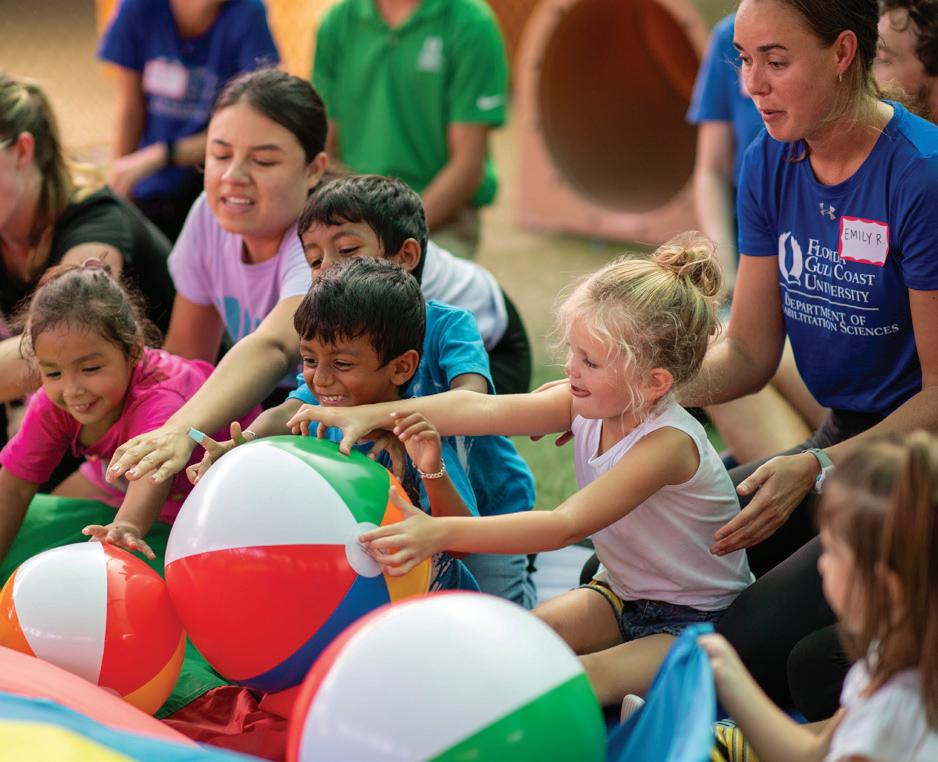
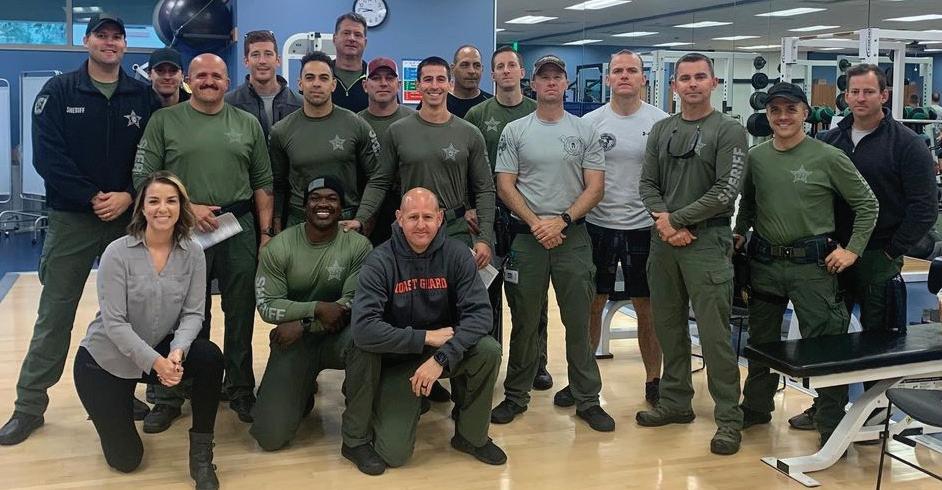
} Students participated in the second anatomical art show, held as part of Marieb Day, an annual tribute to Elaine Nicpon Marieb, Ph.D., for whom the college is named as well as the building in which it resides.
Graduation rate:100%
First-time licensure pass rate: 100% Employment rate: 100%
DEPARTMENT OF REHABILITATION SCIENCES DEGREE PROGRAMS
} Bachelor of Science Exercise Science (BS)
} Master of Science Occupational Therapy (MS)
} Doctor of Physical Therapy (DPT)
} Transitional Doctor of Physical Therapy (TDPT)
DEPARTMENT OF REHABILITATION SCIENCES
Eric Shamus
Left, FGCU OT students conducted body composition analyses for Charlotte County sheriff’s officers. Above, PT students had fun screening Special Olympics athletes in Orlando.
16 MARIEB COLLEGE OF HEALTH & HUMAN SERVICES 2021-2022 ANNUAL REPORT 17
Diverse department continues to educate important health professionals
It was another busy year for the largest department in Marieb College. The Department of Health Sciences accounts for more than 40% of the student credit hours of the college.
Many of the courses have an online component, which made transitioning for COVID-19 relatively seamless and transitioning back much the same.
A first this year was a new study-abroad program in comparative healthcare developed by Lesley Clack, Sc.D., associate professor and department chair. A group of 20, including Clack and Instructor Joan Faris, traveled to Italy and Switzerland to explore the countries’ healthcare systems.
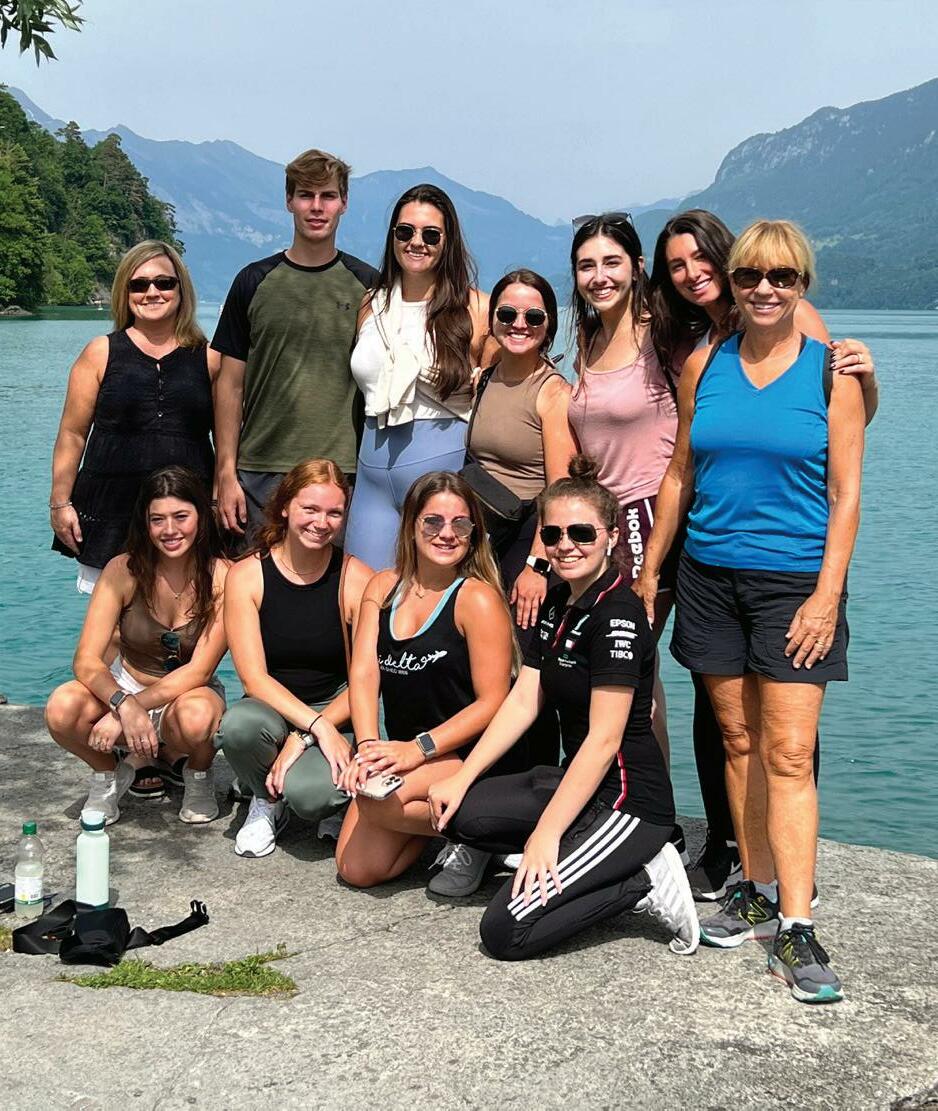
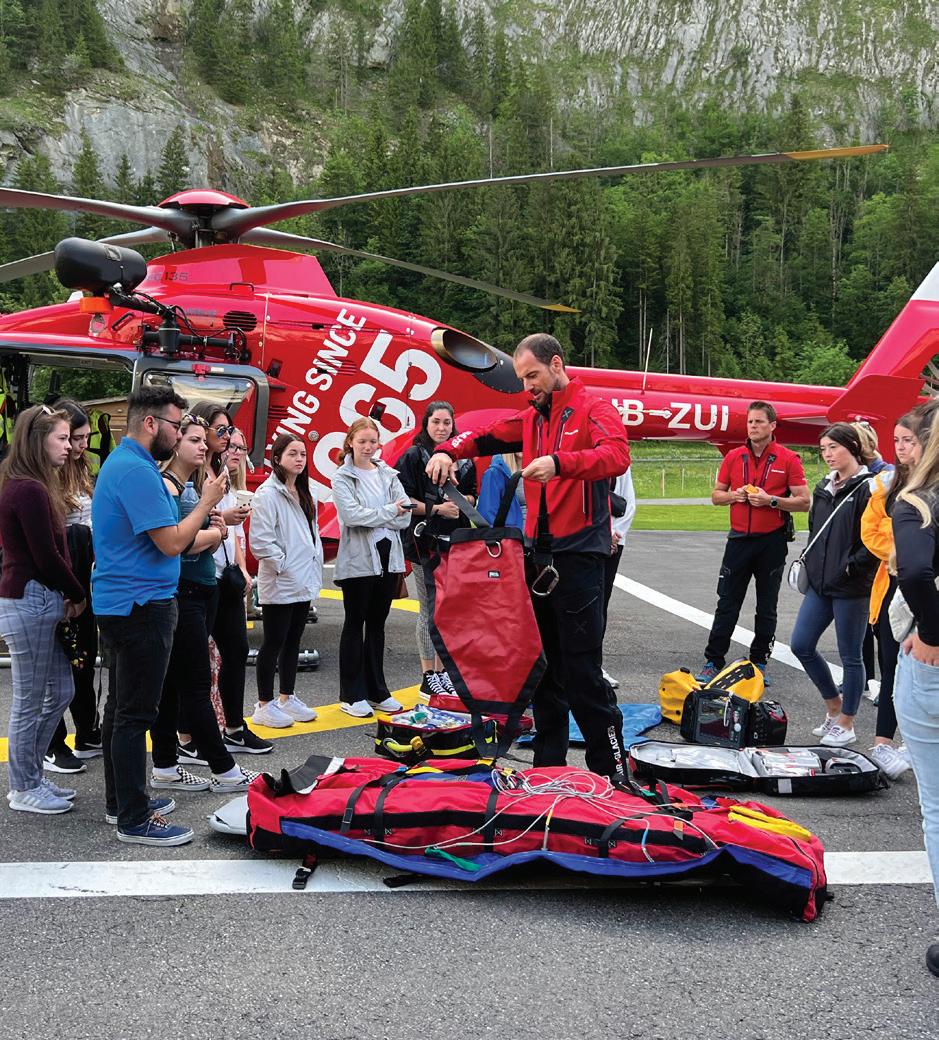
Thirteen FGCU students and four students from the University of Georgia participated in the trip. They began in Geneva, Switzerland, the hub of healthcare in Europe, where they toured the World Health Organization, United Nations facilities and the Red Cross Museum. They also had a guest lecture given by Dorine van der Wal, who works with external relations at the World Health Organization. Next, the group traveled to Interlaken, Switzerland and received a guest lecture and tour of helipad facilities by the Air Glaciers team, which provides search and medicine rescue in the Swiss Alps.
In Italy, the group spent time in Florence, Tuscany and Rome, and enjoyed lectures by Italian physicians on the universal healthcare system. They also visited one of the oldest pharmacies in the world, Officina Profumo-Farmaceutica di Santa Maria Novella, and toured a variety of healthcare facilities and cultural sites, enabling them to contrast and compare them to U.S. healthcare centers.
Clack says, “The students really loved getting to travel to so many different places, and the variety of guest lectures and tours provided a much more immersive experience.”
She plans to offer the program again and have opportunities to explore healthcare systems in other countries. The department also hopes to provide other study-abroad opportunities for students in the future.
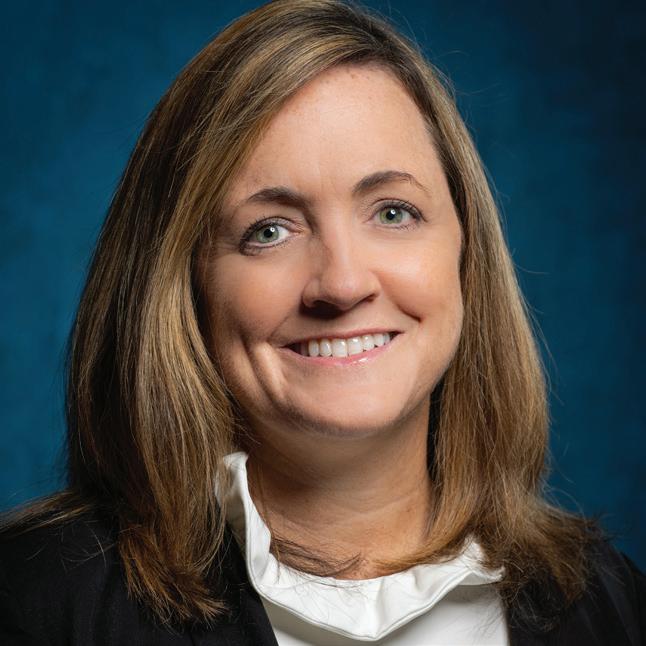
Other highlights this year included:
} Accreditation of the Molecular Diagnostic Certificate program. Accreditation was established in fall 2021 in large part due to the efforts of Julie Zemplinski, program director of Marieb College’s Clinical Laboratory Science Program and the newly implemented molecular diagnostics certificate. The program is accredited by the National Accrediting Agency for Clinical Laboratory Sciences (NAACLS).
Department of Health Sciences students enjoyed 100% graduation and placement rates in 2021.
Interim Dean Shawn Felton says the “program has further demonstrated a critical response to community and workforce needs in the region.”
Through a partnership with Neogenomics, a premier cancer diagnostic, pharma services and information services company, the certificate program is receiving support through scholarship funding for its students.
The program started off with two students and is accepting more. Individuals interested in getting certified in molecular diagnostics can visit the program’s webpage on the Marieb College website.
} The Clinical Laboratory Science program was given a vote of confidence with its reaccreditation for 10 years.
DEPARTMENT OF HEALTH SCIENCES DEGREES
} Bachelor of Science in Clinical Laboratory Science (BS)
} Bachelor of Science in Health Administration (BS)
} Bachelor of Science in Health Sciences (BS)
} Bachelor of Science in Public Health (BSPH)
} Master of Science in Health Sciences (MS)
} Master of Physician Assistant Studies (MPAS)
CERTIFICATES
} Clinical Laboratory Science
} Health Services Administration
} Molecular Diagnostics
DEPARTMENT OF HEALTH SCIENCES
18 MARIEB COLLEGE OF HEALTH & HUMAN SERVICES
Lesley Clack
Health sciences students take in the sights during a study-abroad summer program.
FGCU students observe an Air Glaciers rescue demonstration.
2021-2022 ANNUAL REPORT 19
Synergies between units help meet demand for counseling by growing community
When it comes to access to mental health services, Florida ranks 49th of 50 in the country, according to Mental Health America, a nonprofit dedicated to addressing the needs of those with mental illness.
“There is clearly a need for clinical mental health counselors in Southwest Florida,” says Suzanne Dugger, Ed.D., professor and chair of Marieb College’s Department of Counseling. “Employers are clamoring for more masterslevel counselors, and our students are being hired immediately upon graduation.”
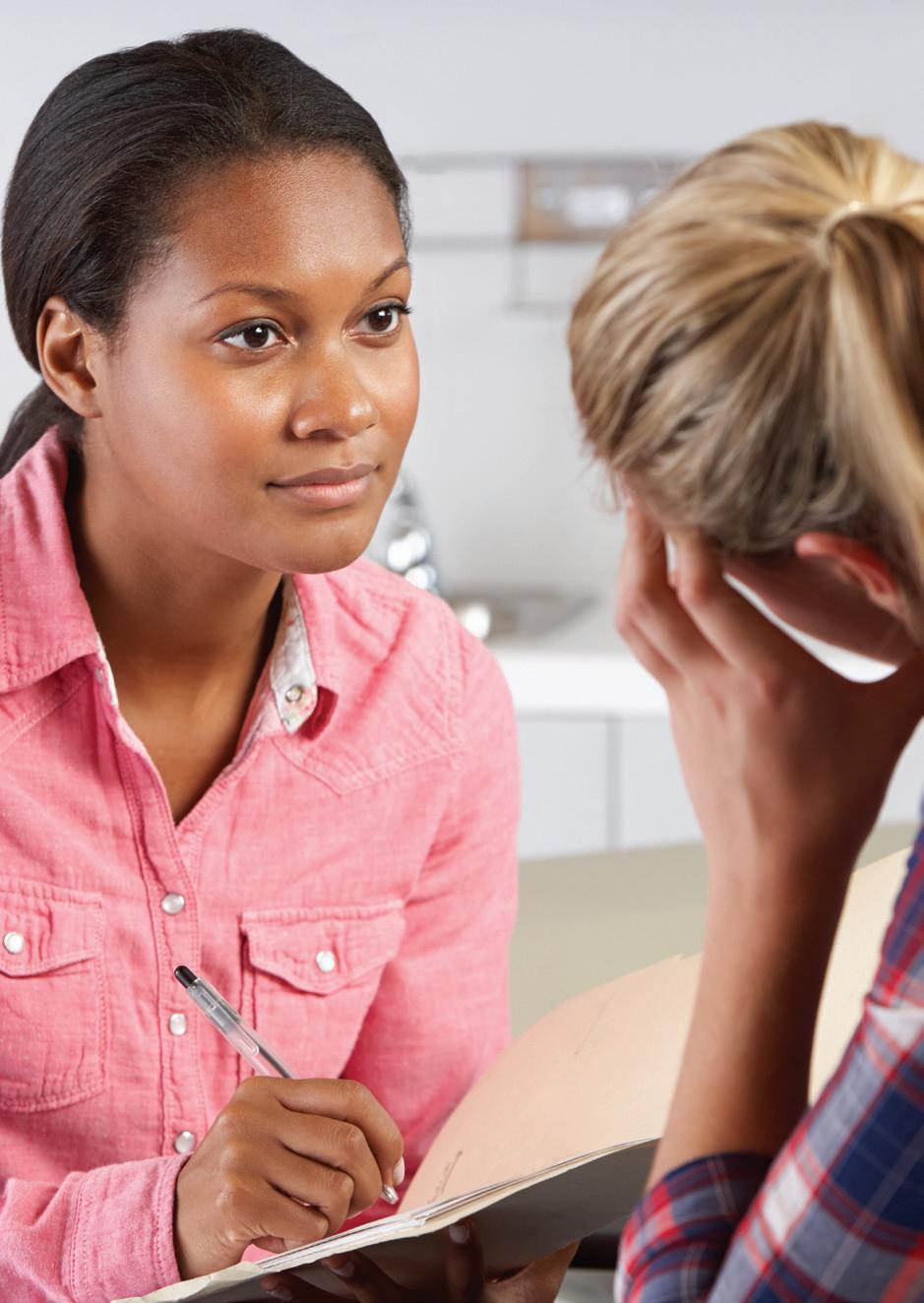
The clinical mental health counseling (CMHC) program achieved an eight-year accreditation by the Council for Accreditation of Counseling and Related Educational Programs.
It’s a master’s program that’s clearly in demand. The 20 students selected for the 2022 cohort represented just 37% of applicants. To accommodate more students who want to become counselors, the college plans to add two counseling faculty positions for the 2023 24 academic year, which will represent a 50 percent increase in CMHC faculty.
Additional instructional resources have come with Counseling and Psychological Services (CAPS) joining Marieb College over the past year. CAPS counselors have also expressed interest in teaching for the Department of Counseling. “It’s an exciting set of synergies,” Dugger says, “that allows for an expansion of our elective offerings.”
The Community Counseling Center (CCC), which is the department-operated training clinic for the CMHC program, continues to provide low-cost services to the community and internships for CMHC graduate students, who spend three semesters working there under supervision.
About a dozen interns work there at any given time. They provide individual, couple and family counseling to children, adolescents and adults in Southwest Florida while receiving intensive clinical supervision from the faculty. “As a result of this intensive training experience, the CCC interns are exceptionally well-prepared for their future as licensed mental health counselors in the community,” Dugger says.
The CCC has also demonstrated impressive flexibility regarding treatment modalities. Initially, the center expected to see clients exclusively in person, but with the advent of COVID-19, it quickly transitioned to telehealth.
At the same time, faculty collected and analyzed data on client responses to this transition. Their research resulted in an article published in the counseling profession’s flagship publication, the Journal of Counseling and Development. Now, clients are split about 50-50 between choosing in-person or online telehealth visits. Dugger explains that some clients experience the telehealth option as more convenient or feel that “it gives them another layer of safety.” Others prefer the inperson experience.
DEPARTMENT OF COUNSELING DEGREE PROGRAMS
CERTIFICATES
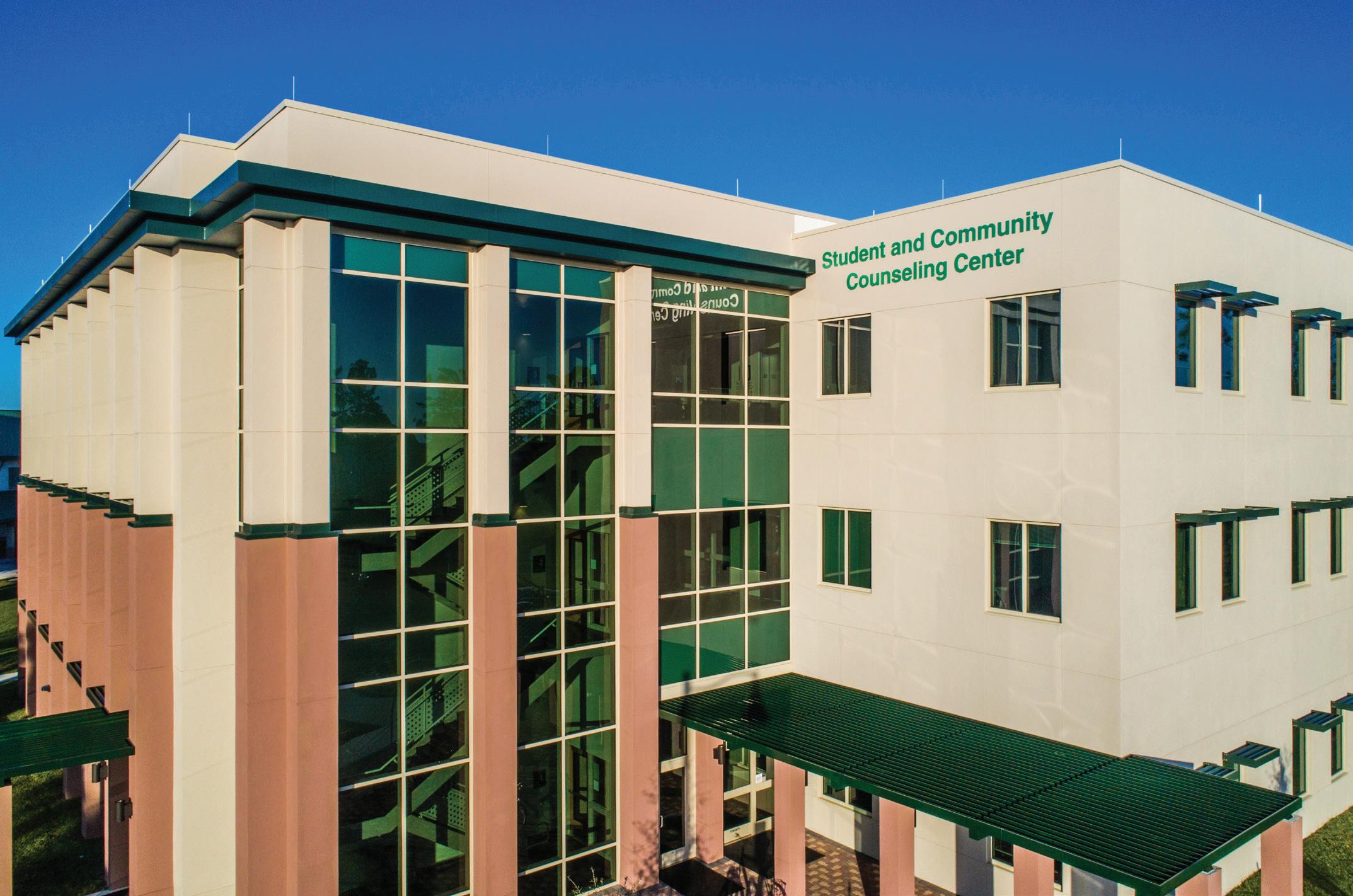
DEPARTMENT OF COUNSELING
20 MARIEB COLLEGE OF HEALTH & HUMAN SERVICES
} Clinical Mental Health Counseling (MA)
} Transition to Mental Health Counseling } Relationship and Family Counseling 2021-2022 ANNUAL REPORT 21
Community Autism Network grows, provides vital services
FGCU’s Community Autism Network has come into its own this year. With a growing number of children being diagnosed with autism spectrum disorder, it’s a muchneeded resource.
Created by Annemarie Connor, Ph.D., assistant professor of occupational therapy, it has attracted $1.4 million in donations this year, including $1 million from the Golisano Foundation, and produced 18 funded FGCU student researcher and five peer-reviewed articles.
It’s also orchestrated 250-plus hours of group interventions, including training and educational opportunities for members of the autism community, service providers, family members, faculty and students.
Awareness of the network grew exponentially this year. It was featured as the FGCU360 Magazine cover story in spring.
And Putting Along the Spectrum, an event hosted by the network that provided young adults with skills to help them gain confidence on the golf course, also netted multiple local news features.
FACTS ABOUT AUTISM:
AUTISM SPECTRUM DISORDER (ASD) is a developmental disability that can cause significant social, communication and behavioral challenges.
Diagnosing ASD can be difficult because there is no medical test for it. Doctors look at the child’s behavior and development to make a diagnosis.
There is currently no cure for ASD. However, research shows that early intervention treatment services can improve a child’s development.
Golisano Foundation awards $1 million to FGCU’s Community Autism Network
A $1 million Golisano Foundation grant to the Community Autism Network at Florida Gulf Coast University will advance initiatives to improve the quantity and quality of resources available to individuals with autism spectrum disorder, their families and related practitioners.
The network was created about a year ago as an interdisciplinary effort within Marieb College of Health & Human Services to conduct research and develop educational and clinical models that could help alleviate a shortage of community services - especially for those with autism who are aging out of school programs and into the workforce and independent living. Nationally, the prevalence of autism has skyrocketed from one child in 150 in 2000 to one in 44 in 2021, according to Centers for Disease Control & Prevention statistics.
established in 1985 by Tom Golisano, founder and chairperson of Paychex Inc., a leader in the payroll, human resource and benefits outsourcing industry.
The foundation is pleased to provide $1 million to expand FGCU’s program, says executive director Ann Costello.
“We commend the university’s commitment to building campus and community capacity to meet the diagnostic, therapeutic, educational and social needs of individuals with autism in Southwest Florida,” Costello says. “We know that this initiative will have a long-lasting and positive impact on those with autism and their families.”
PREVALENCE
The Golisano grant will help FGCU train more students and care providers, initiate more research and provide pro bono diagnostic and skill-building services, according to director Annemarie Connor, Ph.D., an associate professor of occupational therapy at FGCU.

“The focus will be on using the grant with our primary mission of training a workforce that is autism friendly and knowledgeable and to chip away at issues such as long wait lists for autism diagnosis in the region,” Connor says.
The Golisano Foundation is “a world-class leader,” she says, “in helping individuals with intellectual and developmental disabilities and promoting inclusion, self-determination and meaningful engagement opportunities.” It was
Shawn Felton, Ed.D., Marieb’s interim dean, sees Golisano’s investment as a validation of what FGCU’s Community Autism Network is doing.
“To buy into what we’re doing and provide support speaks volumes for what they see and believe in,” he says. “It comes with a responsibility that we deliver at a high quality.”
The Golisano grant will enable the Community Autism Network to make several enhancements: refocus faculty and staff time toward more autism-related work; pay for medical doctors or licensed psychologists to offer diagnostic training on campus for students and practitioners; and hire postdoctoral fellows to conduct research and develop new programming models that can be tested and implemented in the community.
Annemarie Connor
22 MARIEB COLLEGE OF HEALTH & HUMAN SERVICES
YEAR
* 2000 6.7 2002 6.6 2004 8.0 2006 9.0 2008 11.3 2010 14.7 2012 14.5 2014 16.8 2016 18.5 2018 23.0 * COMBINED PREVALENCE PER 1,000 CHILDREN (RANGE ACROSS ADDM SITES)
2021-2022 ANNUAL REPORT 23
Marieb Day pays homage to benefactor on building’s 10th anniversary







Marieb Day, held annually to honor the memory of the generous benefactor for whom both the college and its building are named, took place Feb. 24.

It marked the 10th anniversary of Marieb Hall and the fifth anniversary of the naming of Marieb College of Health & Human Services after the renowned Elaine Nicpon Marieb, R.N., Ph.D., who died in 2018. She was a biologist, nurse and educator who authored 13 anatomy and physiology textbooks used by universities nationwide. Her success allowed her to make a significant impact as a philanthropist by, among other things, making a $15 million investment in FGCU to support the health professions building, program, faculty and scholarships.
Faculty, staff, students and community partners attended the event to pay tribute and to take in the second annual Anatomical Art Show hosted by the Department of Rehabilitation Sciences.



Other events at the celebration included:
} A look at the emerging practice of animal-assisted therapy in occupational therapy, in which students learn about the human-animal bond, animal handling and application in various rehabilitation contexts.

} Information on SEE Me Playgroups – socialemotional education therapeutic groups that are community-based and aim at promoting early learning, providing parents with a sense of competence and allowing opportunities for socialization for parents and children.
} Representatives of Home Base talked about the free program designed to help veterans improve their physical health and well-being through supervised physical exercise, education about healthy eating, living, sleep hygiene and stress management.
I reached a level where I was so hungry for knowledge that there was no stopping me. That’s what education did for me, and I think can do for anybody.”
 —Elaine Nicpon Marieb, Ph.D.
Dr. Elaine Nicpon Marieb
—Elaine Nicpon Marieb, Ph.D.
Dr. Elaine Nicpon Marieb
24 MARIEB COLLEGE OF HEALTH & HUMAN SERVICES
2021-2022 ANNUAL REPORT 25
Exercise is Medicine program shapes up more students, employees
Exercise is Medicine on Campus at FGCU continues to grow. Introduced here in 2016, the program is free for students and employees. It includes a physical activity consultation, fitness assessment, a training session and mentors.



“We continue to use our established participant referral network to help students find the program,” says Patti Bauer, Ph.D., assistant professor and academic adviser to the exercise science program.
The majority of referrals result from a physical activity question on the electronic medical record students complete for Student Health Services.
The 2021-22 year was a busy one as the program geared back up following the pandemic. The team bolstered program offerings and built upon the pilot data being collected. FGCU retained Gold Status recognition from the American College of Sports Medicine.
The Eagles In Motion mentor program also expanded, with FGCU students trained by the Campus Recreation staff to serve as mentors, or “fitness buddies,” to support participants on their physical activity journey. The staff worked with advisers in Marieb and elsewhere around the university to promote mentorship as a service-learning opportunity and a way for more students to engage on campus.
The staff worked hard to expand offerings and awareness, with a renewed focus on faculty and staff. There are some publication submissions in the works for this academic year while the team continues to update the program as needed and collect data for dissemination across higher education.
Securing additional funding continues to be a goal to help support and expand the program. Looking ahead, Bauer says the staff hopes to work with Blue Zones by NCH (a healthy diet and lifestyle program), collaborate with other Florida Exercise is Medicine on Campus programs and improve program awareness across campus.
Shady Rest Foundation promotes careers in eldercare with targeted scholarships
Students pursuing degrees in health fields that focus on older adults are receiving assistance from a foundation that once offered that help itself but is passing the torch to a new generation of caregivers.
Shady Rest Foundation is the entity that oversees the funds from the sale of a facility run by Lee County to care for low-income seniors. The county eventually turned the center over to a nonprofit corporation and, years later, sold it and land on which it sat near Page Field in south Fort Myers.
The officers of Shady Rest Foundation chose to use the proceeds, in part, to fund scholarships
for students who plan to go into healthcare for older adults. The $3 million donation the group made in December will go a long way toward assisting FGCU students in the pursuit of that goal with the creation of two endowments. This gift builds upon the previous year’s $1 million gift to support these students.
In addition, the foundation pledged $5 million to help fund the creation of a facility that will serve as a regional hub aimed at enhancing aging, care delivery and quality of life through research, education and service. It will be named the Shady Rest Institute on Positive Aging in honor of the gift.

2021-2022 ANNUALREPORT 27
26 MARIEB COLLEGE OF HEALTH & HUMAN SERVICES
Bob Hawkes, second from right, physician assistant program director, and recipients of the Shady Rest Foundation scholarships.
fgcu.edu/mariebcollege
This annual report features illustrations of works by artist Lucas Century, whose sandstone etchings of anatomical parts were inspired by the textbooks of Dr. Elaine Nicpon Marieb. His creations adorn the walls of the lobby in Marieb Hall.
















 Shawn Felton, Interim Dean Marieb College of Health & Human Services
Shawn Felton, Interim Dean Marieb College of Health & Human Services
















 COUNSELING
COUNSELING

























 —Elaine Nicpon Marieb, Ph.D.
Dr. Elaine Nicpon Marieb
—Elaine Nicpon Marieb, Ph.D.
Dr. Elaine Nicpon Marieb



